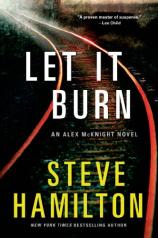Let It Burn: An Alex McKnight Novel
Review
Let It Burn: An Alex McKnight Novel
It is ironic that LET IT BURN, the latest and best installment of Steve Hamilton’s Alex McKnight series, has been published within just a couple of weeks of the bankruptcy filing by the city of Detroit. Detroit, 300 miles and a universe away from the McKnights’ residence in the lakeside town of Paradise, Michigan, is where the action, past and present, occurs as McKnight reluctantly returns to the conflicted city as a homicide case from his past comes back to haunt him.
Part One, titled “Two Summers,” is told in chapters that alternate between McKnight’s past and present. McKnight was a Detroit police officer who, while pursuing a suspect in a drug case, stumbled upon a freshly murdered corpse in a deserted section of Michigan Central Station in Detroit, which at the time was still functioning in part. There was evidence that tied McKnight’s suspect, a young man named Darryl King, to the killing. King was ultimately apprehended, and a confession was obtained by a detective named Arnie Bateman, who was in charge of the investigation. King went to prison, and the matter was forgotten.
"Steve Hamilton is not a fancy writer, though his prose is by no means superficial. He lays his elements out in an orderly and complete manner, and keeps things moving so that the reader constantly turns pages from beginning to end."
In the present, McKnight, now a private investigator in the wilds of Paradise, Michigan, receives a telephone call from Tony Grimaldi, his former but now-retired Detroit PD sergeant, to the effect that King is about to be released on parole. McKnight makes the six-hour drive to Detroit, ostensibly to have a commemorative drink with the sergeant and to see if a relationship with Janet Long, a lovely FBI agent with whom he worked in the past, is worth kindling. While in Detroit, however, McKnight picks up some small bits of information that, coupled with an observation here and a hunch there, causes him to wonder if perhaps, confession notwithstanding, they caught and convicted the wrong man.
Bateman is also retired and living outside of Detroit. When McKnight locates him and raises the possibility that the wrong man may have been convicted, Bateman has a seemingly legitimate answer for each and all of the concerns that McKnight raises. He is not entirely convinced, though. As he continues to investigate on his own, McKnight discovers that it not only appears certain that King was wrongly convicted, but that the real killer has quietly and in plain sight continued on a murder spree during the intervening years.
In part two, titled “The Fall,” McKnight unofficially reopens the investigation that resulted in King’s incarceration. Part of McKnight’s plan is to sit down face to face with the newly released King and ask him a number of questions to see if his new theory of the case is correct. But before he gets the chance, King is in the wind, having seemingly violated his parole after being free for less than 24 hours. Aided by an extremely unlikely ally in the form of King’s mother, McKnight makes a long and dangerous journey in an effort to see that justice is done, not only for a long-dead victim but also for King, who may be hiding a terrible secret and paying a dear price for it.
Steve Hamilton is not a fancy writer, though his prose is by no means superficial. He lays his elements out in an orderly and complete manner, and keeps things moving so that the reader constantly turns pages from beginning to end. He also does not become distracted by soapbox issues. One of the book’s most interesting elements is the presentation of Detroit through McKnight’s perspective. It’s very strong, so much so that at one point I stopped reading to hunt down photographic comparisons between the past and present state of Michigan Central Station, where a pivotal event takes McKnight. Hamilton could have gotten into the issues of how the decline and fall of Detroit came to pass, but he avoided that pitfall since they are not germane to the story. It is this strong sense of perspective in Hamilton’s books that make his work such a consistent joy and pleasure to read.
Reviewed by Joe Hartlaub on August 2, 2013





